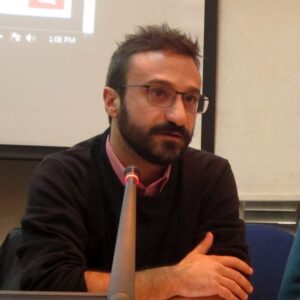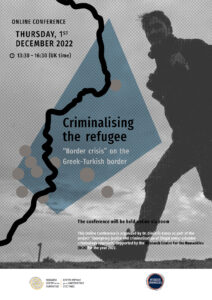Summary of the Research Proposal
The proposed study aims to examine the exceptional conditions at the Greek-Turkish borders during February-March 2020, which led to the criminalisation and imprisonment of a considerable number of refugees who entered Greece irregularly. The research project will be conducted in the following manner: first, casefiles related to the period of concern will be studied, aiming to explore the penal and administrative treatment of the refugees that were instrumentalised by both countries. It will then continue with interviews from individuals and families who were subjected to prosecution, conviction and (possible) imprisonment, in order to record and assess their experience of institutional victimisation and objectification. The findings of the research will be analysed through the lens of border criminology, with the ultimate goal of contributing to a criminological comprehension of the Greek border penality in times of crisis.
Online Conference
Criminalising the refugee: “Border crisis” on the Greek-Turkish border
December 1, 2022
13:30 – 16:30
(UK TIME)
The conference will be held online via zoom.
To attend, register here.
This Online Conference is organized by Dr. Dimitris Koros as part of the project “Emergency justice and criminalisation of illegal entry: a border criminology approach” supported by the Research Centre for the Humanities (RCH) for the year 2022.
13:30 – 13:35 Welcome
Eleni Stambogli, RCH Treasurer
13:35 – 13:50 Introduction
Dimitris Koros, Scientific Associate, Law School, Democritus University of Thrace
“Emergency (in)justice: criminalisation and victimisation. Main findings of the research project”
PANEL 1
13:50 – 14:50 Chair: Dimitris Koros
Each panelist will give a 10 min presentation, followed by discussion
Vasilis Kerasiotis, Attorney at Law, HIAS Country Director
“Criminalization of irregular entry: Punishing refugees for EU’s failed externalization policy”
Thomas Charalampidis, Attorney at Law, ARSIS Child Protection Lawyer
“Delivering justice in an era of exception. Μinors accused of illegal entry in Greece in March 2020. Children or invaders?”
Alexandros Konstantinou, Attorney at Law, Head of Legal Research, Greek Council for Refugees
“The concept of instrumentalisation and fundamental rights”
Anastasia Chalkia, Ph.D., Criminologist–Course coordinator/instructor, National & Kapodistrian
University of Athens
“Crimmigrating International Protection: European policies on migration and asylum in relation to current armed conflicts”
14:50 – 15:00 Break
PANEL 2
15:00 – 16:00 Chair: Victoria Taylor
Each panelist will give a 10 min presentation, followed by discussion
Stefanos Levidis, Dimitra Andritsou, Forensic Architecture/Forensis
“Investigating border violence in the Evros/Meriç and the Aegean Sea”
Natasha Ntailiani, Attorney at Law, Head of Legal Team, Legal Centre Lesvos
“Violation of human rights of migrants and refugees and criminalization of human rights defenders in the era of COVID: the example of Lesvos in spring 2020”
Vasilis Tsianos, Professor of Sociology, Kiel University of Applied Sciences and Nicos Trimikliniotis, Professor of Sociology, Social Sciences and Law, University of Nicosia
“Racial B/Orders: Violence, State Crimes and the Politics of Enmity at the Edges of Europe”
Maria Ioannou, Assistant Professor, University College Groningen and Maria Avramidou, Lecturer in Media and Communication, Erasmus University, Rotterdam
“‘Innocent’ Hashtags? Antimigrant debates on Twitter around #IStandWithGreece and their affinity to European border politics”
16:00 – 16:30 “A way forward? The future of refugee protection at the border”
Chair: Dimitris Koros
A final discussion between panelists and the audience envisaging ways forward for the future of protection.
Research: “
Emergency justice and criminalisation of illegal entry: a border criminology approach”
Research Team: Dimitris Koros
The research project “Emergency justice and criminalisation of illegal entry: a border criminology approach” was funded by the Research Centre for the Humanities (RCH) for the year 2022.
Abstract
The study examines the exceptional conditions at the Greek-Turkish borders during February-March 2020, which led to the criminalisation and imprisonment of a considerable number of refugees who entered Greece irregularly. The research project was conducted in the following manner: first, casefiles related to the period of concern were studied, with the aim to explore the official aspect of the penal treatment of the refugees who crossed the borders. It then continues with interviews from individuals and families who were subjected to prosecution, conviction, and imprisonment, with the aim to record and assess their experience of institutional victimisation and objectification. The findings of the research are analysed through the lens of border criminology, with the goal of contributing to a criminological comprehension of the Greek border penality in times of crisis.
The full academic report for this research’s results is available in Greek. To view it, click here and browse to the tab “Αποτελέσματα Έρευνας”.
 Dimitris Koros studied Law at the Aristotle University of Thessaloniki and gained his MA in Crime, Law and Society from the University of Manchester. In 2016 he completed his PhD thesis in penitentiary policy (title: “Systems and mechanisms of discipline in the Greek prison system: Issues and perspectives”) at the Department of Social Administration and Political Science (Democritus University of Thrace). He is the author of “Discipline and its Limits in the Greek Prison System” (Nissos publishing, 2021) and the editor of Michel Foucault’s “Prison/Governmentality. Two Texts” (translation and post-face, Akivernites Politeies, 2017). He has published articles in Greek and foreign collective volumes and scientific journals. He is a scientific associate at the Law School at the Democritus University of Thrace (participating in the teaching of Criminology, Criminal Investigation, Corrections and Juvenile Law), a tutor counselor for the Hellenic Open University (teaching crime policy) and a post-doctoral researcher. He practices law at the collective law office “Partners Lawyers” and has been working as a lawyer for the Greek Council for Refugees, providing free legal aid in all areas of refugee law and mainly in the field of administrative detention and illegal border practices since 2013.
Dimitris Koros studied Law at the Aristotle University of Thessaloniki and gained his MA in Crime, Law and Society from the University of Manchester. In 2016 he completed his PhD thesis in penitentiary policy (title: “Systems and mechanisms of discipline in the Greek prison system: Issues and perspectives”) at the Department of Social Administration and Political Science (Democritus University of Thrace). He is the author of “Discipline and its Limits in the Greek Prison System” (Nissos publishing, 2021) and the editor of Michel Foucault’s “Prison/Governmentality. Two Texts” (translation and post-face, Akivernites Politeies, 2017). He has published articles in Greek and foreign collective volumes and scientific journals. He is a scientific associate at the Law School at the Democritus University of Thrace (participating in the teaching of Criminology, Criminal Investigation, Corrections and Juvenile Law), a tutor counselor for the Hellenic Open University (teaching crime policy) and a post-doctoral researcher. He practices law at the collective law office “Partners Lawyers” and has been working as a lawyer for the Greek Council for Refugees, providing free legal aid in all areas of refugee law and mainly in the field of administrative detention and illegal border practices since 2013.

